- Home
- Peter Straub
Koko brt-1 Page 7
Koko brt-1 Read online
Page 7
“Did you find Cotton’s name yesterday?” Pumo asked, breaking into his thoughts in a way that seemed to extend them.
Poole shook his head. “Let’s find him today.”
“Hell, let’s find everybody,” Conor said. “What else are we here for?”
4
Pumo listed all the names and their panel locations on the back of an American Express slip. Dengler, 14 West, line 52—Poole remembered that one. Cotton, 13 West, line 73 … Trotman, 13 West, line 18. Peters, 14 West, line 38. And Huebsch, Hannapin, Recht. And Burrage, Washington, Tiano. And Rowley, Thomas Chambers, the only man in their company killed at Ia Thuc. And the victims of Elvis, the swivel-hipped sniper: Lowry, Montegna, Blevins. And more after that. Pumo’s tiny, neat handwriting covered the back of the green American Express slip.
They stood on the stone slabs of the path, looking up together at the names etched into polished black granite. Conor wept before Dengler’s name, and both Conor and Pumo had tears on their faces as they looked at the medic’s name: PETERS, NORMAN CHARLES.
“Goddamn,” Conor said. “Right now, Peters ought to be on top of a tractor, worried that he ain’t going to get enough rain.” Peters’ family had worked the same Kansas farmland for four generations, and the medic had let everyone know that while he temporarily enjoyed being their medical corpsman, sometimes in the night he could smell his fields in Kansas. (“You be smelling Spitalny, not Kansas,” SP4 Cotton said.) Now his brothers worked Peters’ fields, and whatever was left of Peters, Norman Charles, after the helicopter on which he’d been giving plasma to Recht, Herbert Wilson, had crashed and burned was beneath the doubtless fertile soil of a country cemetery.
“He’d just be bitching about how the government is giving a royal screwing to him and all the other farmers,” Beevers said.
Michael Poole saw a huge golden-fringed flag ruffling in the breeze off to his right, and remembered glimpsing the same flag yesterday. A tall wild-haired man held the flag anchored to his wide belt—beside him, nearly obscured by a glistening wreath, stood a round white sign lettered in red: NO GREATER LOVE. Poole thought he’d read that the wild-haired ex-Marine had been standing in the same place for two days straight.
“You see the story about that guy in the paper this morning?” Pumo said. “He’s holding the flag in honor of POWs and MIAs.”
“It won’t bring them back any quicker,” Beevers said.
“I don’t think that’s the point,” Pumo told him.
In that instant, the long black length of the Memorial announced itself—to Poole it was as if it had just spoken and taken a step toward him. Michael remembered this from his first visit. He moved very slightly away from the others. The world was a blur. Once Poole had stood for hours up to his waist in water swarming with leeches, holding his M-16 and his Claymores out of the water until his arms ached, turned to lead, died.… Rowley, Thomas Chambers was standing beside him, also holding his arsenal out of the stinking water. Swarms of mosquitos buzzed around them, settling on their faces. Every few seconds they had to blow tickling mosquitos out of their noses. Poole could remember being so tired that if Rowley had offered to prop up his arms for him, he would have collapsed into sleep right there. He could remember feeling the leeches attach themselves to his thighs.
“Oh God,” Poole said, realizing that he was trembling. He wiped his eyes and looked at the others. Conor was weeping too, and emotion suffused Pumo’s handsome, normally impassive face.
Harry Beevers was watching Poole. He looked about as emotional as a weight-guesser at the state fair. “It got you, hmm?”
“Sure,” Poole said. Profound irritation at Beevers’ smugness flashed through him. “Are you immune?”
Beevers shook his head. “Hardly, Michael. I just keep my feelings inside. That’s the way I was raised. But I was thinking that a bunch of names ought to be added to this thing. McKenna. The Martinsons. Danton and Guibert. Remember?”
Poole had no desire to try to explain what he had just experienced. He too could think of at least one name that could be added to those on the wall.
Beevers virtually twinkled at Michael. “You know that we’re going to get rich out of this, don’t you?” And for some Beeversish reason utterly opaque to Michael Poole, he tapped him twice on the chest with an extended index finger. The finger appeared to have been manicured. Then Beevers turned to Pumo and Linklater, evidently saying something about the Memorial. Michael could still feel Harry’s index finger playfully jabbing at his sternum.… Only problem is that it doesn’t have enough names on it, he heard Beevers saying.
A hundred dying mosquitos packed Poole’s nostrils; dying leeches clamped onto his weary, dying legs. It was decided, Poole knew: as if in imitation of their ignorant, terrified, and variously foolhardy nineteen-year-old selves, they really were going to take off for the Far East all over again.
PART
TWO
PREPARATIONS
FOR
TAKEOFF
1
“Maggie never comes in here, Maggie had enough,” said Jimmy Lah, answering Harry’s question as he poured a silvery ribbon of vermouth over the ice and liquid already in the glass. He squeezed a paring of lemon rind around the rim of the glass, then slipped it down into the ice cubes.
“Enough of life, or enough of Tina?” Beevers asked.
Jimmy Lah placed on the bar a fresh paper napkin with the word Saigon printed in slanting red letters over the silhouette of a man pulling a rickshaw. He set Harry Beevers’ drink on the napkin and with a sideways sweep of his hand gathered up the damp, torn napkin beside it. “Tina’s too normal for Maggie.”
The bartender winked at Harry, then stepped backwards. Harry was startled to find himself looking at the spiteful, jealous faces of demons with cat’s whiskers and long faces, taped to the mirror. Until Jimmy Lah moved away, they had been hidden from view. Harry Beevers felt a surprising familiarity with these demons. He knew that he had seen spiteful faces like these somewhere in I Corps, but could not remember where.
It was four o’clock and Harry was killing time before calling his ex-wife. Jimmy Lah was pouring some soapy blender concoction for the bar’s only customer besides himself, a fruitcake with a roosterish yellow Mohawk and oversized pink eyeglasses.
Harry swiveled around on his stool to face the large rectangular dining room of Pumo’s restaurant. Before him were knobby bamboo chairs at glass-topped bamboo tables. Ceiling fans with blades like polished brown oars revolved slowly overhead. The white walls had been painted with murals of giant fronds and palm leaves. The place looked as if Sidney Greenstreet would walk in at any moment.
Behind a counter at the far end of the restaurant a door swung open, revealing two Vietnamese men in white aprons chopping vegetables. Behind them pots bubbled on a gas range. Harry caught a glimpse, unexpected as a mirage, of a fluttering translucent curtain behind the range. He leaned forward to get a better look and felt a familiar inward flinch as he saw Vinh, Pumo’s head chef, darting toward the open door. Vinh was from An Lat, an I Corps village only a few klicks from Ia Thuc.
Then Harry saw who had opened the door.
Just beneath Harry’s normal field of vision, a small, smiling Vietnamese girl was moving cautiously but swiftly into the restaurant. She had nearly reached the counter when Vinh managed to grab her shoulder. The child’s mouth became an astonished 0, and Vinh hauled her back into the kitchen. The doors swung shut on a burst of Vietnamese.
In an eerily perfect auditory hallucination, Harry Beevers could hear M.O. Dengler panting just behind his right shoulder, along with the sounds of distant fires and faraway screams. Pale faces shone dimly at the center of a vast darkness. He remembered where he had seen the demons’ faces before—on small black-haired women, rushing up with their fists raised. You numbah ten! You numbah ten!
An abyss had just yawned before Harry Beevers. For a moment he felt the terror of not existing, a sickening feeling that he had never existed in t
he way simpler, healthier people existed.
He heard himself asking what a kid was doing in the kitchen.
Jimmy stepped nearer. “That’s Vinh’s little girl, Helen. Both of them temporarily staying here. Helen was probably looking for Maggie—they’re old buddies.”
“Tina must have a lot on his mind,” Harry said, beginning to feel more in control of himself.
“You see the Village Voice?”
Harry shook his head. He realized that he had unconsciously pushed his hands into his pockets to hide their shaking. Jimmy searched around behind the bar until he found the paper in a stack of menus beside the cash register and slid it across the bar with the back page up. VOICE BULLETIN BOARD, read the headline above three dense columns of personals in varying type sizes. Harry saw that two of the ads had been circled.
The first message read: Foodcat. Missing damned you. Will be Mike Todd Room 10 Wed. The Wanderer. The second message was in caps. JUST DECIDED UNABLE TO DECIDE. MAY BE MIKE TODD, MAYBE NOT. LA-LA.
“See what I mean?” Jimmy asked. He began grabbing glasses from below the bar and vigorously swirling them around in a sink.
“Your sister placed both these ads?”
“Sure,” Jimmy said. “Whole family’s crazy.”
“I feel sorry for Tina.”
Jimmy grinned, then looked up from the sink. “How’s the doctor these days? Any change?”
“You know him,” Harry said. “After his son died, he stopped being fun to hang out with. Totalemente.”
After a second, Jimmy asked, “He going on your hunting trip?”
“I wish you’d call it a mission,” Harry snapped. “Listen, isn’t Tina ever going to come up for air?”
“Maybe later,” Jimmy said, looking away.
Pumo had two Vietnamese living in his restaurant, he was tearing his kitchen apart to kill a few bugs, and he was acting like a teenager over Maggie Lah. ‘La-La,’ for sure. Beans Beevers’ old comrade had become just another … for a second he searched for Dengler’s word, then had it: toon.
“Tell him he ought to show up at the Mike Todd Room with a fucking knife in his belt.”
“Maggie will get a big kick out of that.”
Harry looked at his watch.
“You planning to get to Taipei on this mission, Harry?” asked Jimmy, showing a trace of real interest for the first time.
Beevers felt a premonitory tingle. “Aren’t you and Maggie from Taipei?” A nerve jumped in his temple.
Then he got it! Who was to say that Tim Underhill still lived in Singapore? Harry had been to Taipei on his R&R, and he could easily see Tim Underhill choosing to live in the raunchy amalgam of Chinatown and Dodge City he remembered. He saw that Divine Justice, mistakenly thought to be dozing, had of course been wide awake all along. It was all ordained, everything had been thought out beforehand. God had planned it all.
Harry settled back down on his bar stool, ordered another martini, and put off his confrontation with his ex-wife for another twenty minutes while he listened to Jimmy Lah describe the seamier aspects of night life in the capital city of Taiwan.
Jimmy set a steaming cup of coffee before him. Harry folded the napkin into the inside pocket of his suit and glanced up at the angry demons. He saw a child rushing toward him with an upraised knife, and his heart speeded up. He smiled and scalded his tongue with hot coffee.
2
A short time later Harry stood at the pay telephone next to the men’s room in a narrow downstairs corridor. He first tried finding his ex-wife at the Maria Farr Gallery, which was on the ground floor of a former warehouse on Spring Street in SoHo. Pat Caldwell Beevers had gone to private school with Maria Farr, and when the gallery had seemed to be failing, took it on as one of her pet private charities. (In the early days of his wife’s involvement with the art gallery, Harry had endured dinner parties with artists whose work consisted of rusting pipes strewn randomly across the floor, of a row of neat aluminum slabs stood on end, of pink wart-encrusted columns that reminded Harry of giant erections. He still could not believe that the perpetrators of these adolescent japes earned real money.)
Maria Farr herself answered the telephone. This was a bad sign.
He said, “Maria, how nice to hear your voice again. It’s me.” In fact, the sound of her voice, all the consonants hard as pebbles, reminded Harry of how much he disliked her.
“I have nothing to say to you, Harry,” Maria said.
“I’m sure that’s a blessing to both of us,” Harry said. “Is Pat still in the gallery?”
“I wouldn’t tell you if she were.” Maria hung up.
Another call, to Information, got him the number of Rilke Street, the literary magazine that was Pat’s other ongoing charity. Its editorial offices were actually the Duane Street loft of William Tharpe, the magazine’s editor. Because Harry had spent fewer evenings with Tharpe and his impoverished contributors than with Maria Farr and her artists, Tharpe had always taken Harry more or less at face value.
“Rilke Street, William Tharpe speaking.”
“Billy, my boy, how do you do? This is Harry Beevers, your best flunky’s best ex-husband. I was hoping to find her there.”
“Harry!” said Tharpe. “You’re in luck. Pat and I are pasting up issue thirty-five right this minute. Going to be a beautiful number. Are you coming down this way?”
“If invited,” he said. “Do you think I might speak to the dear Patricia?”
In a moment Harry’s ex-wife had taken the telephone. “How nice of you to call, Harry. I was just thinking about you. Are you getting on all right?”
So she knew that Charles had sacked him.
“Fine, fine, everything’s great,” he said. “I find myself in the mood for a celebration. How about a drink or dinner after you’re through tickling old Billy’s balls?”
Pat had a short discussion with William Tharpe, most of it inaudible to Harry, then returned the receiver to her mouth and said, “An hour, Harry.”
“No wonder I’ll always adore you,” he said, and Pat quickly hung up.
3
When his cab passed a liquor store, Harry asked the driver to wait while he went in and bought a bottle. He jumped out, crossed the sidewalk, his coattails billowing, and entered a barnlike, harshly lighted interior with wide aisles and pastel blue neon signs announcing IMPORTED and BEER and FINE CHAMPAGNES. He started moving toward the FINE CHAMPAGNES, but slowed down when he saw three young women with eggbeater hair and antisocial clothing preceding him up the aisle. Punk girls always excited Harry. The three girls ahead of Harry in the aisle of the liquor store were consulting in whispers and giggles over a bin of inexpensive red wines, their fluffy multicolored heads bobbing like toxic orchids to some private joke.
One of them was blonde-and-pink-haired, and nearly as tall as Harry. She picked up a bottle of burgundy and slowly revolved it in her long fingers.
All three girls were dressed in torn black garments that looked as if they had been picked up off the street. The shortest of them bent over to examine the bottle being caressed by the tallest girl and pointed a round bottom toward Harry. Her skin was a sandy, almost golden shade. For an instant Harry was aware only that he knew who she was. Then Harry saw her profile printed sharply against a blue neon background. The girl was Maggie Lah.
Harry stepped forward, grinning, aware of the contrast between his suit and the girls’ rags.
Maggie broke away from the others and glided to the top of the aisle. The other two hurried after. The tall one reached out and closed a white hand on Maggie’s shoulder. Harry saw a sunken cheek covered with dark stubble. The tall girl was a man. Harry stopped moving and his smile froze on his face. Maggie rubbed the side of her hand against the man’s stubbly cheek. The three of them continued up to the top of the aisle and turned toward FINE CHAMPAGNES without seeing Harry.
Maggie and her friends veered into the side aisle lined with refrigerated cases. The neon sign shed pale blue light over them. Ha
rry remembered that he had entered this store to buy a bottle of champagne as a sweetener for Pat when he saw Maggie open the glass doors of a refrigerated case. On her face was an expression of sweetly concentrated attention. She plucked out a bottle of Dom Perignon and slid it instantly into her clothes, where it disappeared. The theft of the bottle had taken something like a second and a half. Harry had a sudden picture, vividly clear, of the dark, cold bottle of Dom Perignon nestled between Maggie’s breasts.
Without any premeditation of any kind, Harry slammed open the glass door and yanked out another bottle of Dom Perignon. He remembered the mystically smiling face of the Vietnamese girl moving toward him through Saigon’s kitchen door. He shoved the bottle beneath his suit jacket, where it bulged. Maggie Lah and her ratty friends had begun to stroll toward the rank of cash registers at the front of the store. Harry thrust his hand inside his coat, upended the bottle, and jammed its neck into his trousers. Then he buttoned his jacket and coat. The bulge had become only slightly conspicuous. He began following Maggie toward the cash registers.
The clerks at the few working registers punched buttons and pushed wine bottles down the moving belts. Maggie and the others sailed past an empty counter and a uniformed security guard lounging against the plate-glass window. As Harry watched, they vanished through the door.
“Hey, Maggie!” he yelled. He trotted past the nearest unattended cash register. “Maggie!”
The guard looked up and frowned. Harry pointed toward the door. Now everybody at the front of the store was staring at him. “I saw an old friend,” Harry said to the guard, who looked away without responding and leaned back against the window.
By the time Harry got to the sidewalk, Maggie was gone.

 Poe's Children: The New Horror: An Anthology
Poe's Children: The New Horror: An Anthology Koko
Koko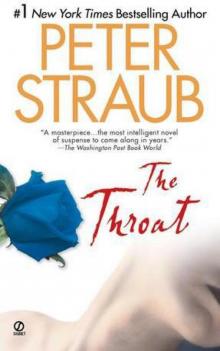 The Throat
The Throat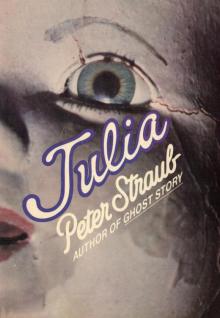 Julia
Julia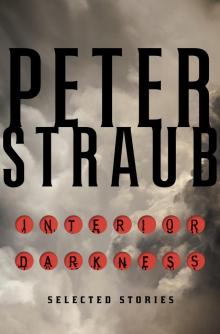 Interior Darkness: Selected Stories
Interior Darkness: Selected Stories A Dark Matter
A Dark Matter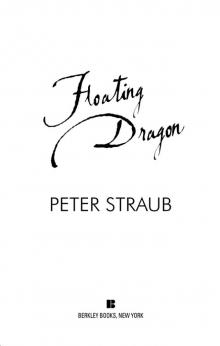 Floating Dragon
Floating Dragon Houses Without Doors
Houses Without Doors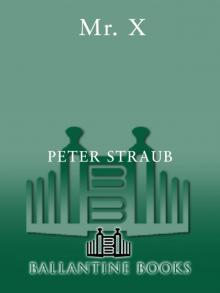 Mr. X
Mr. X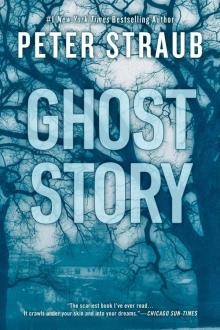 Ghost Story
Ghost Story Mystery
Mystery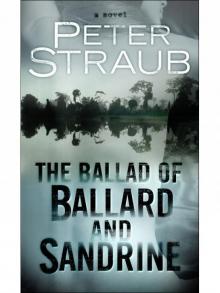 The Ballad of Ballard and Sandrine
The Ballad of Ballard and Sandrine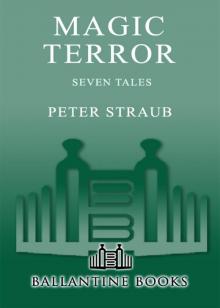 Magic Terror
Magic Terror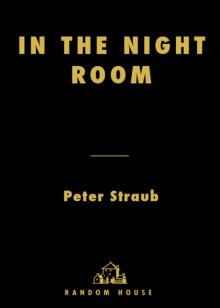 In the Night Room
In the Night Room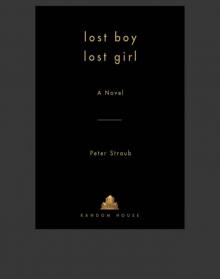 Lost Boy Lost Girl
Lost Boy Lost Girl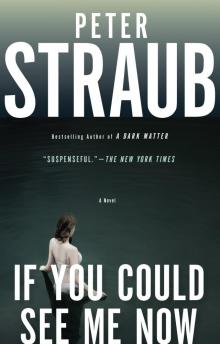 If You Could See Me Now
If You Could See Me Now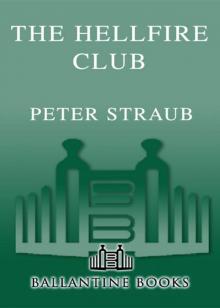 The Hellfire Club
The Hellfire Club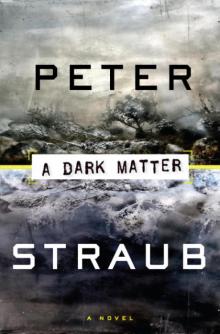 A Dark Matter: A Novel
A Dark Matter: A Novel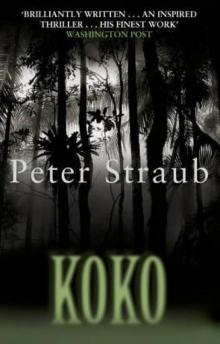 Koko brt-1
Koko brt-1 Shadowland
Shadowland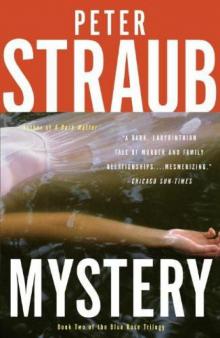 Mystery brt-2
Mystery brt-2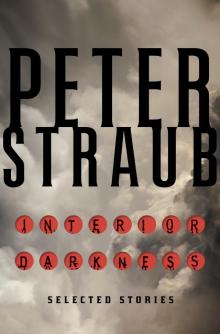 Interior Darkness
Interior Darkness Poe's Children
Poe's Children